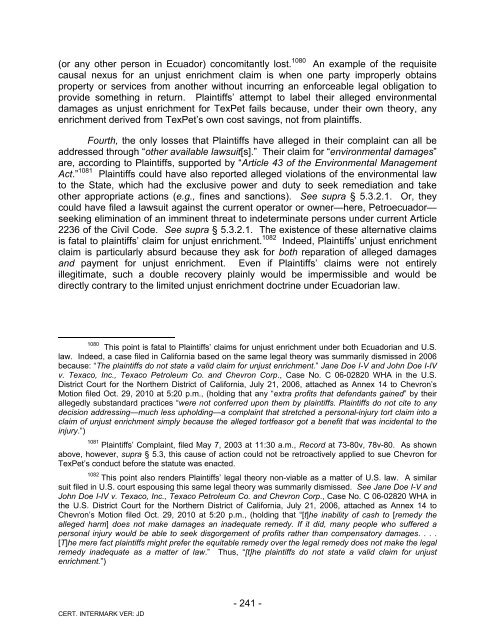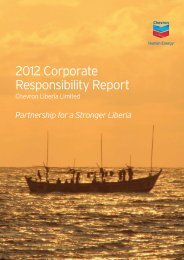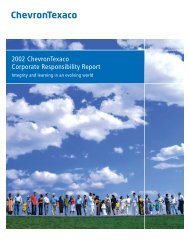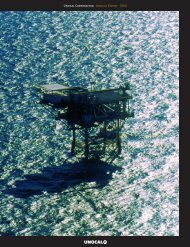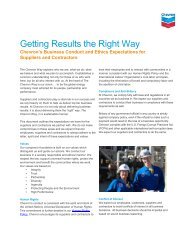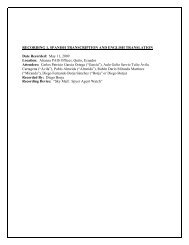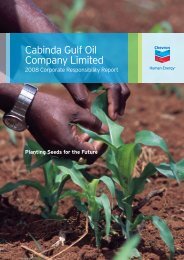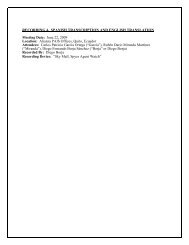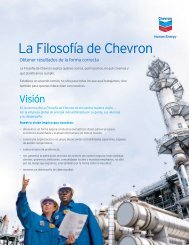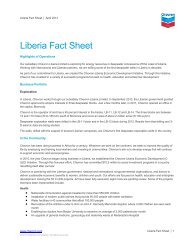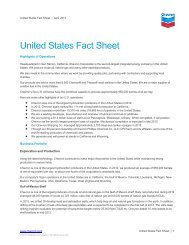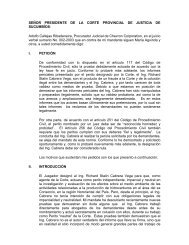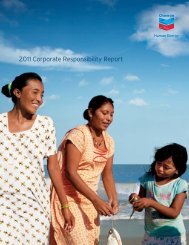-i- TO THE SUBROGATE PRESIDENT OF THE ... - Chevron
-i- TO THE SUBROGATE PRESIDENT OF THE ... - Chevron
-i- TO THE SUBROGATE PRESIDENT OF THE ... - Chevron
Create successful ePaper yourself
Turn your PDF publications into a flip-book with our unique Google optimized e-Paper software.
(or any other person in Ecuador) concomitantly lost. 1080 An example of the requisite<br />
causal nexus for an unjust enrichment claim is when one party improperly obtains<br />
property or services from another without incurring an enforceable legal obligation to<br />
provide something in return. Plaintiffs’ attempt to label their alleged environmental<br />
damages as unjust enrichment for TexPet fails because, under their own theory, any<br />
enrichment derived from TexPet’s own cost savings, not from plaintiffs.<br />
Fourth, the only losses that Plaintiffs have alleged in their complaint can all be<br />
addressed through “other available lawsuit[s].” Their claim for “environmental damages”<br />
are, according to Plaintiffs, supported by “Article 43 of the Environmental Management<br />
Act.” 1081 Plaintiffs could have also reported alleged violations of the environmental law<br />
to the State, which had the exclusive power and duty to seek remediation and take<br />
other appropriate actions (e.g., fines and sanctions). See supra § 5.3.2.1. Or, they<br />
could have filed a lawsuit against the current operator or owner—here, Petroecuador—<br />
seeking elimination of an imminent threat to indeterminate persons under current Article<br />
2236 of the Civil Code. See supra § 5.3.2.1. The existence of these alternative claims<br />
is fatal to plaintiffs’ claim for unjust enrichment. 1082 Indeed, Plaintiffs’ unjust enrichment<br />
claim is particularly absurd because they ask for both reparation of alleged damages<br />
and payment for unjust enrichment. Even if Plaintiffs’ claims were not entirely<br />
illegitimate, such a double recovery plainly would be impermissible and would be<br />
directly contrary to the limited unjust enrichment doctrine under Ecuadorian law.<br />
1080 This point is fatal to Plaintiffs’ claims for unjust enrichment under both Ecuadorian and U.S.<br />
law. Indeed, a case filed in California based on the same legal theory was summarily dismissed in 2006<br />
because: “The plaintiffs do not state a valid claim for unjust enrichment.” Jane Doe I-V and John Doe I-IV<br />
v. Texaco, Inc., Texaco Petroleum Co. and <strong>Chevron</strong> Corp., Case No. C 06-02820 WHA in the U.S.<br />
District Court for the Northern District of California, July 21, 2006, attached as Annex 14 to <strong>Chevron</strong>’s<br />
Motion filed Oct. 29, 2010 at 5:20 p.m., (holding that any “extra profits that defendants gained” by their<br />
allegedly substandard practices “were not conferred upon them by plaintiffs. Plaintiffs do not cite to any<br />
decision addressing—much less upholding—a complaint that stretched a personal-injury tort claim into a<br />
claim of unjust enrichment simply because the alleged tortfeasor got a benefit that was incidental to the<br />
injury.”)<br />
1081 Plaintiffs’ Complaint, filed May 7, 2003 at 11:30 a.m., Record at 73-80v, 78v-80. As shown<br />
above, however, supra § 5.3, this cause of action could not be retroactively applied to sue <strong>Chevron</strong> for<br />
TexPet’s conduct before the statute was enacted.<br />
1082 This point also renders Plaintiffs’ legal theory non-viable as a matter of U.S. law. A similar<br />
suit filed in U.S. court espousing this same legal theory was summarily dismissed. See Jane Doe I-V and<br />
John Doe I-IV v. Texaco, Inc., Texaco Petroleum Co. and <strong>Chevron</strong> Corp., Case No. C 06-02820 WHA in<br />
the U.S. District Court for the Northern District of California, July 21, 2006, attached as Annex 14 to<br />
<strong>Chevron</strong>’s Motion filed Oct. 29, 2010 at 5:20 p.m., (holding that “[t]he inability of cash to [remedy the<br />
alleged harm] does not make damages an inadequate remedy. If it did, many people who suffered a<br />
personal injury would be able to seek disgorgement of profits rather than compensatory damages. . . .<br />
[T]he mere fact plaintiffs might prefer the equitable remedy over the legal remedy does not make the legal<br />
remedy inadequate as a matter of law.” Thus, “[t]he plaintiffs do not state a valid claim for unjust<br />
enrichment.”)<br />
CERT. INTERMARK VER: JD<br />
- 241 -


